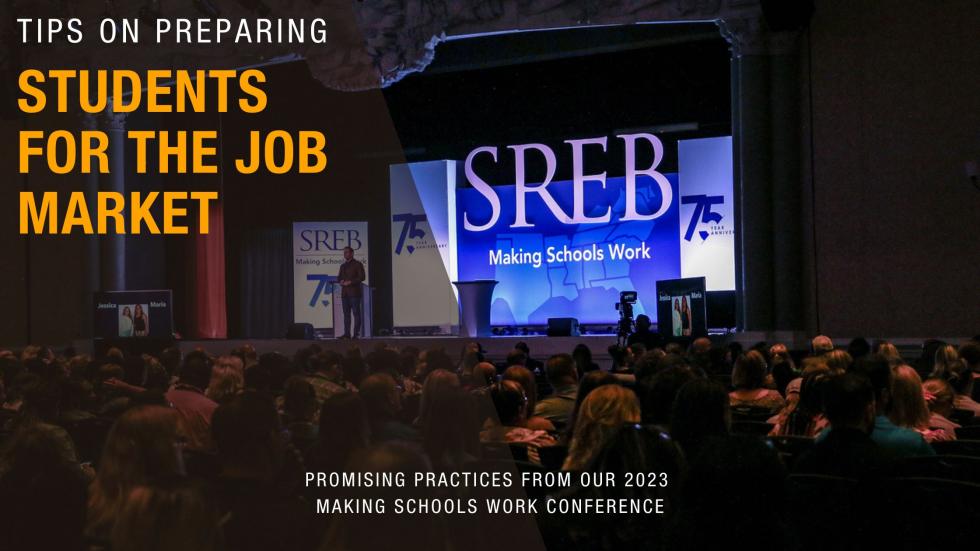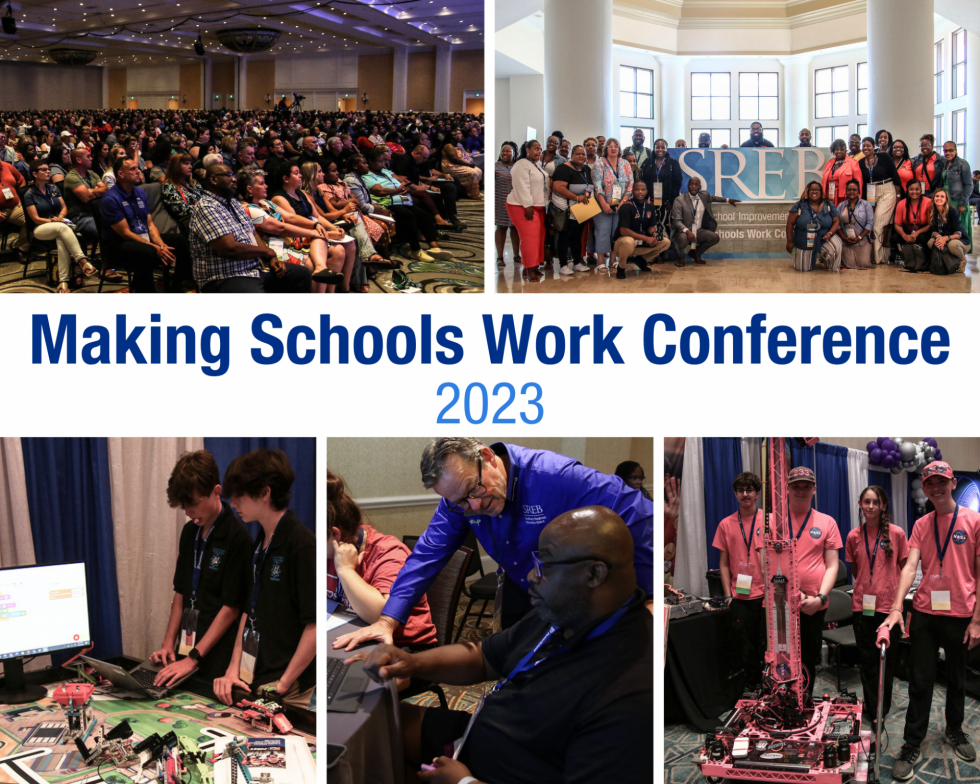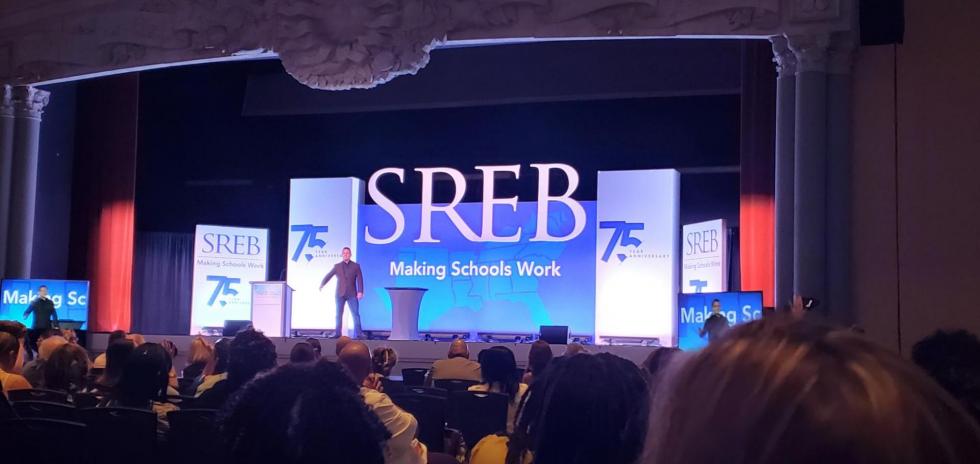Combining Education With Job Skills: Tips From the 2023 Making Schools Work Opening Address
Prefer to listen? Check out the audio recording of this post instead.
This year, I attended the Making Schools Work Conference for the first time. The 2023 conference was held in Orlando, Florida, on July 18-21. Along with getting to hang out at the beautiful venue, I got to network with educators and listen to some awesome speakers.
If you missed the conference – or you just miss it now – then don’t worry! Over the next year, we are going to bring you regular posts all about some of the amazing sessions we attended this year.
Each month, we will give you a new theme, and we will focus on the great tips we got from various sessions relating to that theme. For August, I’ll bring you posts with conference highlights, so you’ll feel like you were in the room, even if you weren’t able to attend.
Let’s start this series in the same way the conference started: with the opening address.
Kevin J. Fleming
To set the scene, let me tell you a little bit about our opening speaker, Keving J. Fleming, the founder and CEO of Catapult, an organization that provides schools with professional development opportunities. He specializes in CTE training, and, perhaps most importantly for a keynote speaker, he is great at talking!
Let’s see what he had to say.
Overeducated, Underemployed
One of the first things that made me really connect with this speech was when he talked about his educational background. Despite having multiple degrees, he says that having those degrees didn’t help him get a high paying job.
As someone with a JD, a master’s and most of a Ph.D. (I’m still working on that one), I really felt this part of the talk. Degrees don’t necessarily equal jobs, and unless you know how to make the connections to the industry you are trying to join, you might find yourself with more letters at the end of your name than dollars in your bank account.
For Kevin, it was only when he got a certification in geographical information systems that he was able to get a job that paid his bills. This taught him how important it was to not just collect degrees, but to build industry skills.
Through the course of helping other educational institutes find out the importance of CTE skills, he came away with many tips, which he shared with us there, and which I will share with you now.
Tips on Making Students Hirable, Not Just Educated
As Kevin himself pointed out, we “don’t steal” in this industry, “we harvest.”
Here is what I harvested from Kevin J. Fleming.
Tip 1: The education system needs to match the new reality.
Life used to be divided into three steps: education, career and retirement. Education is built around this so-called “career-ladder,” but now, the process is much more recursive — you work while you learn in order to pay for the education. You learn while you work to prepare for the job. Our system needs to be more integrative to facilitate this new balance.
We are in an era where creativity, problem solving and agility are important skills to pass onto students, and we need new metrics to ensure that we are.
Tip 2: Industry experiences will give students competitive advantages in both educational programs and job opportunities.
Kevin used the story of two young women with very similar backgrounds and life goals. Both had impressive educations, plenty of extracurricular activities and hopes to go to the same medical school to eventually get jobs in similar fields.
One, however, conducted her work experience in more traditional means — being the resident assistant at a dorm.
The other, on the other hand, worked as an EMT after taking a 10-week certification class. Both females were Hispanic, but in their medical school applications, only one was able to write about her experience translating medical information to the Spanish-speaking patients she was able to help on the job.
One got into her first-choice medical school. The other did not. I’ll let you figure out which one was accepted.
It’s no longer just about extracurriculars. It’s about the industry experiences.
Action Item: Want any easy way to start implementing this tip? Start by asking yourself what industry certificates you are currently offering and what you could be offering. Our dynamic speaker recommended CareerOneStop to help with this.
Once you have taken an inventory of your certification offerings, make sure students and their parents know these opportunities exist.
Tip 3: Sometimes all you need to do to make a big difference is to change your approach.
Kevin told a story about a little girl who was struggling at her swim meets, never winning. One day, her mom told her that she had faith that she could finish higher in the rankings if she just tried her hardest. The little girl looked up in surprise and asked, “It’s a race? I thought we were just here to meet people!”
With the new knowledge of what a swim meet actually meant, the girl, with nothing else changed, approached the event differently and actually won a heat!
Sometimes, you don’t have to change everything about what you do as an educator because adjusting your goals can make a big difference on its own.
Tip 4: Know the 1-2-7 ratio.
Next, Kevin talked about a Georgetown University prediction that says going forward, we will see the following 1-2-7 ratio when it comes to educational requirements for a job opening:
For every one job that requires a master’s degree or higher, there will be two jobs that require a university degree only and seven that require a one-year industry certification or two-year degree.
On top of this, the majority of jobs that will only require a certification or associate degree will be in high-skilled industries with great demands for employees.
In other words, most students likely will not need much higher education beyond high school. However, they will need these job skills and industry certifications.
Tip 5: To make these changes, you need school culture to match.
You can make some of these changes on your own, but to really make a difference, you need your school to be on board. So, get your teachers, admin, board members and every part of the team on the same page.
Sometimes you need to bring in outside experts to help you convince your organization.
The Bottom Line
The new normal is going to involve more CTE, problem-solving and certification measures than ever before.
What can you do to help put more of this focus into your school? Here are some ideas:
- SREB’s School Improvement team can help you with some of these measures, so check out our services.
- On top of that, see when Kevin J. Fleming is speaking again to get more tips from him. He also has many other resources on his website you could use.
- Finally, keep checking here for more of the promising practices we learned at the 2023 Making Schools Work Conference!
Want to make sure you never miss these tips? Sign up for our Promising Practices Newsletter, where we send monthly tips, videos and lesson-based articles from our conferences.
Subscribe to Promising Practices




